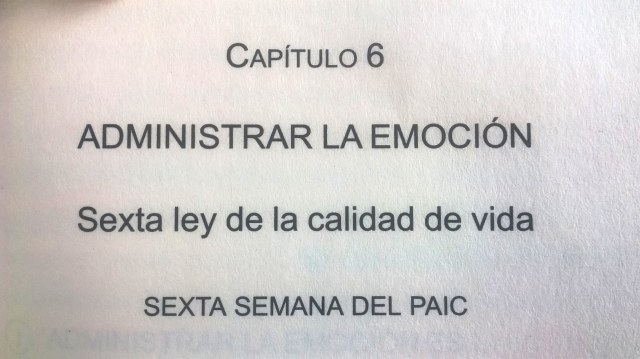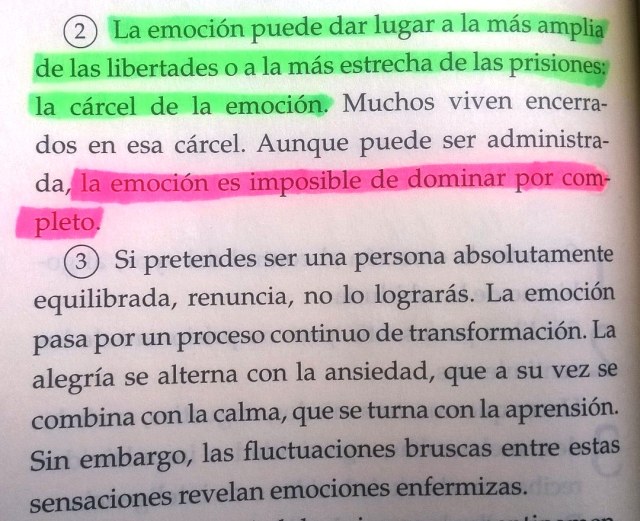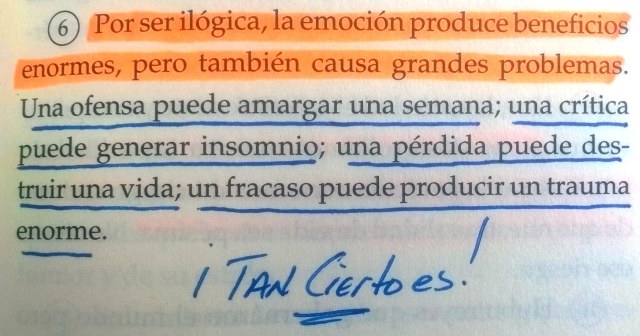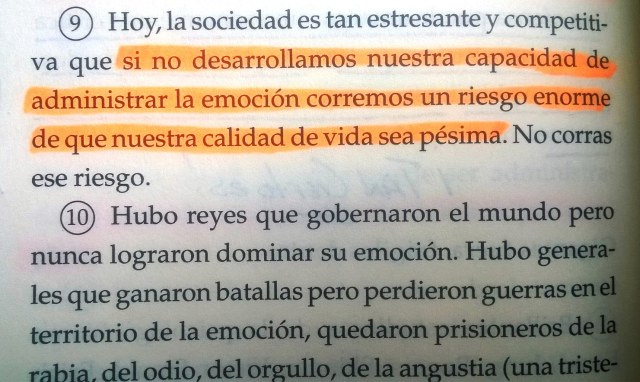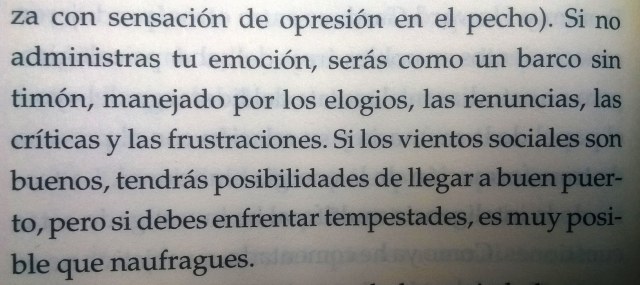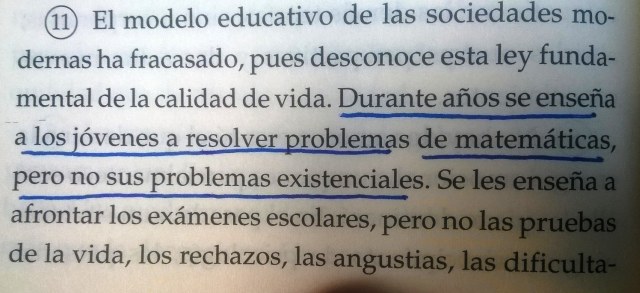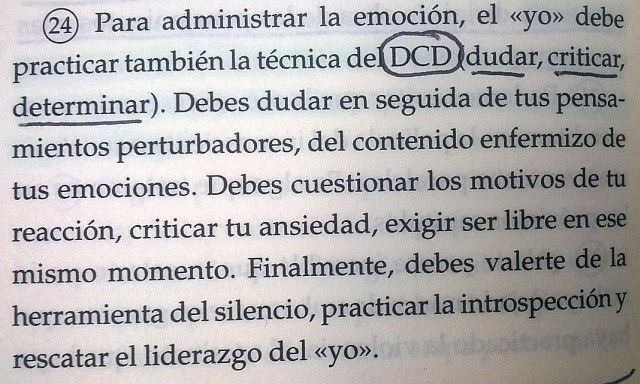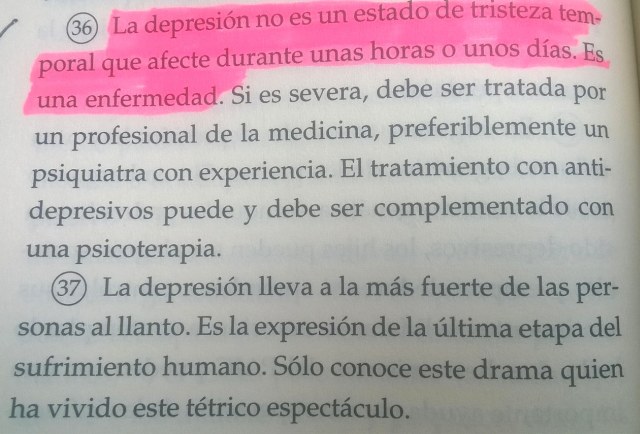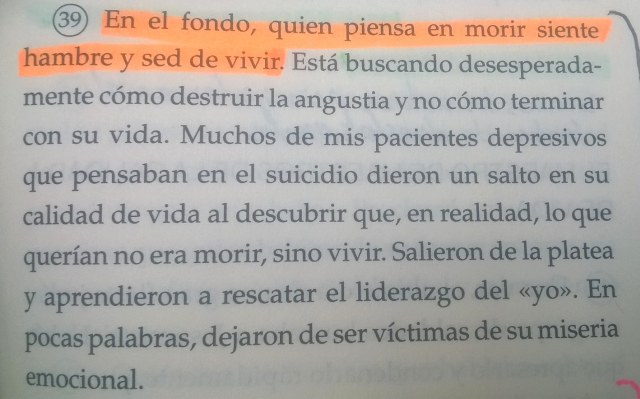Chapter 6
MANAGE EMOTION
Sixth law of quality of life
SIXTH WEEK OF PROGRAM
2. Emotion can give rise to the most ample of liberties or the narrowest of prisons: the jail of emotion. Many live locked up in this prison. Though it can be administered, it is impossible to completely dominate emotion.
3. If you want to be a person who is perfectly balanced, forget it, you will never achieve it. Emotion goes through a continual process of transformation. Happiness alternates with anxiety, which at the same time combines with calm, which turns into apprehension. Nevertheless, brusque fluctuations between these sensations reveals sickly emotions.
 5. Emotions is more difficult to govern than thoughts. It is illogical. But the result is so beautiful. A mother will never give up on her children, no matter how much they disappoint her.
5. Emotions is more difficult to govern than thoughts. It is illogical. But the result is so beautiful. A mother will never give up on her children, no matter how much they disappoint her.
For being illogical, emotion produce huge benefits, but also causes big problems. An offense may sour a week; criticism can generate insomnia; a loss can destroy a life; a failure can produce tremendous trauma. (Very true!)
9. Today, society is so stressful and competitive that if we do not develop our capacity to administer emotion we run an enormous risk of having a terrible quality of life. Don’t run this risk.
10. There have been kings who have ruled the world but were never able to dominate their emotion. There have been generals who have won battles but lost wars in the territory of emotion, held prisoners of anger, of hate, of pride, and of anguish.
If you don’t manage emotion, you will be like a ship without a rudder, controlled by praise, by giving up, by criticism and frustration. If the social winds are good, you will have to get to a decent port, but if you must confront bad weather, you will likely get stranded.
The educational model in modern society has failed, since it is unaware of this fundamental law for quality of life. For years youngsters are taught to solve mathematical equations, but not their existential problems. They are shown how to take exams at school, but not the tests of life, the rejection, the anguish and the difficulty.
 Our “I” should come out from the audience, get up on stage and direct the play of thought and emotion. (LOVE THIS ONE!)
Our “I” should come out from the audience, get up on stage and direct the play of thought and emotion. (LOVE THIS ONE!)
24. To manage emotion, our “I” should also practice the technique of DCD (doubt, criticize, determine). You should doubt perturbing thought immediately, from the sickly content of your emotions. You should question the motives of your reactions, criticize your anxiety, demand freedom in this moment. Finally, you should take advantage of the tool of silence, practice introspection and recover leadership of your “I”.
36. Depression is not a temporary condition lasting a few hours or days. It is a sickness. If is sever, it should be treated by a medical doctor, preferably a psychiatrist with experience. Treatment with anti-depressives can be and should be complemented by psychotherapy.
37. Depression takes the strongest to sobs. It is the last stage of human suffering. Only he or she who has experienced its dismal spectacle can know its drama.
39. In the end, he who thinks about dying feels hunger and thirst to live. He is looking desperately for a way to destroy anguish and not how to end his life. Many of my depressed patients who though of suicide made a great leap in their quality of life by discovering that, in reality, what they wanted was not to die, but to live. They got out of the audience and learned to recover the leadership of “I”. In a few words, they stopped being victims of their emotional misery.
We should never give up on life; we need to confront our losses and deceptions with humility and courage. Daily we should criticize, confront, and manage our sickly emotions. Shout silently in your interior.
When we are abandoned by the world, loneliness can be overcome; when we are abandoned by ourselves, the loneliness is almost incurable…


